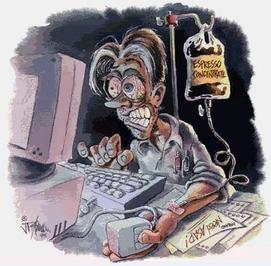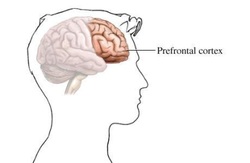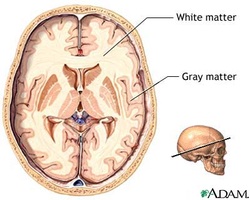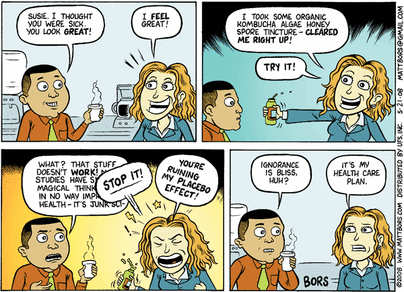Neurotransmitters and Addiction

Addiction to a substance can have positive or negative effects. If we are addicted to habits that improve us, like staying fit, it is a positive addiction. However, if we are addicted to video games, this could negatively affect our lives. If we are too addicted to video games, our relationships may be hurt to the point where they could be entirely lost. We may lose more sleep due to the playing of video games. Development of carpal tunnel may occur. But, what exactly makes a video game addictive? What drives us to the point where we don't want to do anything but play games? Why do we feel good when we play games? The answer could be in neurotransmitters. When we play games, the dopamine levels in our brain are increased drastically.

Dopamine is a neurotransmitter that regulates the mood in the body. A neurotransmitter is a bodily chemical that transmits impulses or messages across a synapse. A synapse is a gap between two neurons. Dopamine is linked to feelings of immense pleasure. It has often been compared to adrenaline. Dopamine controls movement, emotions, and the ability to feel pleasure, which also means the ability to feel pain. As we play games and our dopamine level is increased in our frontal lobes, we are relieved of our pain and our feeling of pleasure is dramatically increased. Since this is what we feel while we are playing games, this could set forth an argument that playing video games is chemically addictive. Dopamine is most successful when the positive outcome is unexpected, like in gambling.
Shockingly, people with low levels of dopamine are the ones that are most likely to become addicted to gambling. The findings of several tests explain why this is. When a reward was given to a person, the dopamine levels were increased. When the reward was given four or more times, the dopamine level remained the same. When the reward was not given, the dopamine level dropped. In gambling, the chances of winning are usually random. So, when the gambler wins just once, their dopamine level increases greatly. The first time a compulsive gambler wins, their dopamine level shoots up, and they feel great satisfaction and pleasure. Their logic is thrown out the window. They forget that they are probably going to lose more than they are going to win, but they need that feeling of pleasure to come back again. They will continue to gamble their lives away in order to get that great surge of dopamine every time they get that little reward.
Interestingly enough, dopamine is the same neurotransmitter that causes people to get addicted to cocaine. Cocaine causes the natural cycle of dopamine to be stopped. It stops the neurotransmitter from being recycled back in. The dopamine stays in one spot in the brain and causes extreme pleasure that the new addict will want more of.
Shockingly, people with low levels of dopamine are the ones that are most likely to become addicted to gambling. The findings of several tests explain why this is. When a reward was given to a person, the dopamine levels were increased. When the reward was given four or more times, the dopamine level remained the same. When the reward was not given, the dopamine level dropped. In gambling, the chances of winning are usually random. So, when the gambler wins just once, their dopamine level increases greatly. The first time a compulsive gambler wins, their dopamine level shoots up, and they feel great satisfaction and pleasure. Their logic is thrown out the window. They forget that they are probably going to lose more than they are going to win, but they need that feeling of pleasure to come back again. They will continue to gamble their lives away in order to get that great surge of dopamine every time they get that little reward.
Interestingly enough, dopamine is the same neurotransmitter that causes people to get addicted to cocaine. Cocaine causes the natural cycle of dopamine to be stopped. It stops the neurotransmitter from being recycled back in. The dopamine stays in one spot in the brain and causes extreme pleasure that the new addict will want more of.

Everyday we unconsciously try to do whatever it takes to get that feeling of pleasure from that release of dopamine. When we don't get that reward, we try to figure out what we are doing wrong so that we can get that reward, and therefore that feeling of satisfaction. Feelings of pleasure and satisfaction are desired by people universally. If there is something that we can do that will give us pleasure, we will be doing that. We have to be careful to control our wants so that we don't get addicted.
"The essence of pleasure is spontaneity"
- Germaine Greer
Lying and the Brain

The brain is perhaps the most important organ in the body. It helps you function every day, and without the brain, we would not be alive. One part of the brain that we use every day is the prefrontal cortex. The prefrontal cortex is basically like our conscience --- it helps us learn moral behavior, distinguish right from wrong, feel guilty, makes choices and judgments, control emotions, and lie. When we lie, this part of the brain is the most active.

Researchers have found that liars have more wiring in their brain, the part of the brain that delivers one thought to another part, "white matter", than truth tellers. They also have less "gray matter", the part of the brain that computes information and thinks, like a computer. Pathological liars have a significant amount, almost a surplus, of white matter. It is believed that the connections make the processing speed faster in the brain. "By having more connections," Yang, the researcher behind this ground-breaking new information, says, "you can jump from one idea to another and you can come up with more random stories and ideas."
Gray matter, however, is severely lacking in those that lie often. This means that they have better skills necessary for lying and less of a moral conscience. It seems that the more white matter the person has, the better they are at lying. The gray matter in our brains stops us from lying as much; it keeps us in check.
Gray matter, however, is severely lacking in those that lie often. This means that they have better skills necessary for lying and less of a moral conscience. It seems that the more white matter the person has, the better they are at lying. The gray matter in our brains stops us from lying as much; it keeps us in check.
Placebo Effect

If you give a person a placebo, you are telling them it's medicine, but it isn't actually. A common example would be giving someone candy and telling them it's medicine. Other examples include giving someone a procedure, a treatment, or injection that isn't really what it is said to be. In the placebo effect, people psychologically cure themselves because they believe in the power of the medicine. They have this idea that the medicine will definitely cure them, when in fact, it doesn't actually have any medicinal purpose. There have been extraordinary cases of the placebo effect where the placebo has cured depression, anxiety, and even cancer. The remarkable outcomes of how the mind can play tricks on you hasn't failed to amaze.
Placebo effects are typically successful in one in every 3 patients. Some researchers believe that the placebo effect works because of the body's natural way of dealing with the symptoms. Perhaps all the patient needed was the strength to believe that his/her body could fight the medical condition. www.cancer.org explains, " The patient's mind somehow causes short-term physical changes in the body. The patient expects to feel better, and so he or she does feel better for some time. But even if a person feels better after taking a placebo, it doesn't mean the person's illness or symptoms were not real." The placebo effect shows the mind's power to manipulate the rest of the body into believing they will be cured. This mind game shows how connected your brain is to the rest of your body.
Placebo effects are typically successful in one in every 3 patients. Some researchers believe that the placebo effect works because of the body's natural way of dealing with the symptoms. Perhaps all the patient needed was the strength to believe that his/her body could fight the medical condition. www.cancer.org explains, " The patient's mind somehow causes short-term physical changes in the body. The patient expects to feel better, and so he or she does feel better for some time. But even if a person feels better after taking a placebo, it doesn't mean the person's illness or symptoms were not real." The placebo effect shows the mind's power to manipulate the rest of the body into believing they will be cured. This mind game shows how connected your brain is to the rest of your body.
http://www.scientificamerican.com/article.cfm?id=placebo-effect-a-cure-in-the-mind
http://www.cancer.org/Treatment/TreatmentsandSideEffects/TreatmentTypes/placebo-effect
http://www.webmd.com/balance/news/20060202/lying-makes-brain-work-morehttp://www.scienceagogo.com/news/20050904005107data_trunc_sys.shtml
http://www.usc.edu/uscnews/stories/11655.html
http://www.npr.org/templates/story/story.php?storyId=87922568http://www.anxiety-and-depression-solutions.com/insight_answers/dopamine.php
http://serendip.brynmawr.edu/bb/neuro/neuro05/web1/isiddiqui.html
http://www.nytimes.com/2002/02/19/science/hijacking-the-brain-circuits-with-a-nickel-slot-machine.html?src=pm
http://www.cancer.org/Treatment/TreatmentsandSideEffects/TreatmentTypes/placebo-effect
http://www.webmd.com/balance/news/20060202/lying-makes-brain-work-morehttp://www.scienceagogo.com/news/20050904005107data_trunc_sys.shtml
http://www.usc.edu/uscnews/stories/11655.html
http://www.npr.org/templates/story/story.php?storyId=87922568http://www.anxiety-and-depression-solutions.com/insight_answers/dopamine.php
http://serendip.brynmawr.edu/bb/neuro/neuro05/web1/isiddiqui.html
http://www.nytimes.com/2002/02/19/science/hijacking-the-brain-circuits-with-a-nickel-slot-machine.html?src=pm
